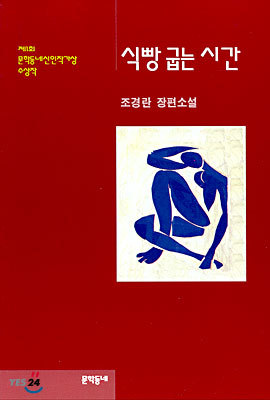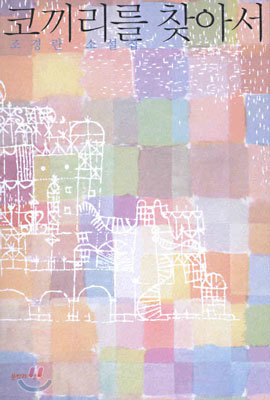Jo Kyung Ran (born 1969) is a South Korean writer.
Life
Jo Kyung Ran was born in Seoul in 1969. She studied creative writing at Seoul Institute of the Arts, initially thinking she would become a poet, but switched to fiction upon the recommendation of her teacher, the poet Kim Hyesoon.
Jo made her literary debut in 1996 winning the Dong-a Ilbo New Writer's Contest with the short story "Bullanseo angyeongwon" (불란서 안경원 French Optical). The same year, she won. The Munhak Dongne New Writer Award with Sikppang gumneun sigan (식빵 굽는 시간 Time for Baking Bread).
She is the author of the short story collections Bullanseo angyeongwon, Naui jajutbit sopa (나의 자줏빛 소파 My Purple Sofa), Kokkirireul chajaseo (코끼리를 찾아서 Looking for the Elephant), Gukja iyagi (국자 이야기 About a Ladle), Pungseoneul sasseo (풍선을 샀어 I Bought Balloons), Iryoirui cheolhak (일요일의 철학 Sunday Philosophy), Eonjenga tteonaeryeoganeun jibeseo (언젠가 떠내려가는 집에서 From the House that will Wash Away Someday), Gajeong sajeong (가정 사정 Family Circumstances); the novels Sikppang gumneun sigan, Gajogui giwon (가족의 기원 Origin of Family), Urineun mannan jeogi itda (우리는 만난 적이 있다 We Have Met Before), Hyeo (혀 Tongue), Bogeo (복어 Blowfish); a collection of microfiction, Huhuhuui Sup (후후후의 숲 Huhuhu's Forest); and three collections of essays. Jo is the recipient of the Hyundae Munhak Literary Award and the Dong-in Literary Award.
Writing
Jo's work is famous for taking trivial, mundane, and everyday occurrences and delicately describing them in subtle emotional tones. Jo tends to dwell on the impressions things make, and with precision and sensitivity, describes their effect on the inner world of the protagonist. Often, she describes her characters minimally or presents them like objects lacking personality, thereby accentuating human alienation and difficulty of communication in the modern world. The author, nonetheless, suggests a possibility for meaningful human relationships by shedding light on those aspects of life that has not been corrupted by merely consumeristic or sexual interactions.
The neighborhood of Bongcheon-dong in Seoul, where Jo has lived for most of her life, is inseparable from her fiction, providing the setting for various works such as "Kokkirireul chajaseo," "Nan jeongmal giriniranikka" (난 정말 기린이라니까 I Really am a Giraffe), "Naneun bongcheondonge sanda" (나는 봉천동에 산다 I Live in Bongcheon-dong), "Bongcheondongui yuryeong "(봉천동의 유령 The Ghost of Bongcheon-dong), and many of the works collected in Eonjenga tteonaeryeoganeun jibeseo. The other central motif underlying Jo's work is a tragic incident that occurred before her birth, the death of her paternal grandmother by suicide. On her birthday, Jo's grandmother prepared blowfish soup and drank it in front of her family, including Jo's father, who was nine years old at the time. In the author's note to Bogeo, Jo wrote, "Sadness, beauty, fear, and death. I write about these things that overpower me. These things that hold me in thrall and will not let go...Ever since I became a writer, I have been waiting to write this novel. A story I could only ever tell once. I did not want to tell it too soon."
Nach Abschluss der Oberschule lebte sie bis zu ihrem 25. Lebensjahr von der Welt zurückgezogen zu Hause, bevor sie ein Studium im kreativen Schreiben am Seoul Institute of the Arts aufnahm und 1996 mit „Französischer Optikerladen“ (bullanseo angyeongwon) debütierte. Jo Kyung-rans Werke zeichnen sich durch eine sehr feinfühlige Art schriftstellerischer Beobachtungsgabe und Vorstellungskraft aus. Hauptsächlich thematisiert die Autorin die Isolation und Einsamkeit in der modernen, verstädterten Gesellschaft, den Abbruch zwischenmenschlicher Beziehungen und die Entfremdung zur eigenen Familie. Sie grenzt sich dadurch klar von der älteren Generation koreanischer Schriftsteller und deren Thematik der Spaltung und Geschichtsaufarbeitung des Landes ab.
En las novelas de Jo Kyung Ran, la descripción del instante o del detalle merece mayor relevancia que el desarrollo del argumento: bucear en el mar, cocinar, hacer tostadas, mentiras nimias y pequeños robos, tuberías de agua potable estropeadas por un par de días, etc. se convierten en temas cardinales. Dependiendo de los temas, en sus novelas raras veces hay diálogos: lo que rige para los protagonistas de sus relatos es el aislamiento, la alienación y la ruptura de las relaciones humanas.6 La "ruptura de las relaciones humanas" es la clave para entender el mundo literario de Jo Kyung Ran. La mayoría de sus personajes principales se encuentran en un aislamiento profundo y sufren por la ruptura de sus relaciones.7 Su último relato, "Cuento del cucharón", presta especial atención a la oportunidad de superar la alienación en el centro del mundo secreto e íntimo del individuo. Este mundo interior le queda velado al mundo capitalista, que juzga a las personas según su funcionalidad. El cuento apuesta por la esperanza de que la pasión y la ilusión de cada persona sean la raíz perentoria de la existencia humana y que, desde la comprensión del mundo particular de los otros, brote una comunicación sincera entre los seres humanos.
Jo Kyeong-ran dépeint dans ses récits les événements les plus anodins du quotidien pour mieux montrer les problèmes et le risque d'aliénation de la vie contemporaine. Elle tente de saisir l’infime possibilité de former des relations humaines significatives entre les êtres malgré la dureté du monde qui nous entoure, le consumérisme et une certaine obsession de l'image et de la sexualité. Elle est ainsi connue pour ses descriptions délicates des expériences les plus infimes du quotidien. Plutôt qu'une description narrative de ces épisodes, elle se concentre sur les impressions que ses épisodes laissent aux personnages avec précision et sensibilité.
1969年、ソウル特別市に生まれる。1966年、東亜日報新春文芸に短編『불란서 안경원(仏蘭西眼鏡屋)』が当選し、登壇した。そして同年発表した長編『식빵 굽는 시간(食パンを焼く時間)』が第1回文学トンネ新人作家賞を受賞し、注目を浴びた。この小説の主人公はパンを焼く技術を習っている女性で、一生懸命作ったパンを家族や周りの人々にあげようとするが、母、彼氏、父、叔母が次々とそのパンを拒否し、結局周りから見捨てられ一人になる話である。 趙の作品は、生活の周りで起きるささやかなことの細かい描写が特徴である。そして、人物の間で起きる事件に対する叙述よりは、主人公の内面に描かれる外部世界の印象や観念、日常的な過程に対する鋭利なアプローチが印象的である。また、趙の小説には一番近い関係であるべきの家族から捨てられ孤独な人々がよく登場する。最近発表した『풍선을 샀어(風船を買った)』には、パニック障害、認知症、パーキンソン病を患う人物たちが登場する。しかし、血縁関係のない人々が類似家族の関係を通じて苦しみや疾病から回復していく可能性を描いているという点で希望的な面を見せている。
조경란(1969~)은 대한민국의 소설가다.
생애
조경란은 1969년 서울에서 태어났다. 서울예전 문예창작과를 졸업했다. 1996년 《동아일보》 신춘문예에 단편 〈불란서 안경원〉이 당선되어 작품 활동을 시작했다.
2008년에는 작가가 2007년에 출간한 장편소설 《혀》(2007)가 소설가 주이란의 단편소설 〈혀〉를 표절했다는 의혹을 받았다. 이후 한동안 작품 활동을 하지 않다가, 2022년 가족관계에 대한 탐구를 시도한 연작소설 《가정 사정》을 출간했다.
작품 세계
조경란은 삶의 주변에서 일어나고 있는 사소한 일들에 대한 세밀한 묘사 그리고 인물들 사이에 일어나는 사건에 대한 서술보다는, 주인공의 내면에 그려지는 외부세계의 인상이나 관념, 극히 일상적인 과정들에 대한 예리한 접근으로 작품의 주제를 전달한다. 작가는 많은 작품들 속에서 등장인물들을 간략하게 처리하거나 인격을 가진 존재와는 거리가 먼 사물들처럼 표현하는데, 이러한 표현들을 통해 인간이 겪는 고독과 소통 불가능성의 문제적인 성격이 두드러진다.
작가의 첫 소설집 《불란서 안경원》(1997)는 탄탄한 구성과 섬세한 문체를 바탕으로 미묘한 인간관계의 내면과 삶의 심층을 파고든다. 표제작인 〈불란서 안경원〉을 비롯하여 〈내 사랑 클레멘타인〉, 〈천국처럼 낯선〉 등 단편미학의 성취를 보여주는 10편의 중, 단편소설이 수록되었다. 작가는 누추하고 단조로운 일상과 가족이라는 제도적 굴레, 속악한 세상의 폭력성과 세속성에 주목하고 이를 섬세한 시선으로 소설화했다.
소설집 《언젠가 떠내려가는 집에서》(2018)는 모두 여덟 편의 단편소설로 이뤄져 있다. 특히 작가는 이번 소설집에서 가족관계 등 사람들의 관계가 시작되는 작은 변화의 지점들이 삶에 어떻게 작용하는지를 풀어내며, 개인과 타인의 문제를 탐구한다.
연작소설 《가정 사정》(2022)에는 치유되지 못한 오래된 상처를 지닌 가족 구성원들이 등장한다. 작가는 일상의 흐름에 따라 상처를 잊은 듯 살아가는 인물들의 어긋나고 교차하는 대화를 세심하게 포착해내면서, 지워지지 않는 아픔을 간직하며 살아온 사람들이 서로의 삶을 진심으로 대면하는 모습을 그려내었다.
주요 작품
1) 소설집
《불란서 안경원》, 문학동네, 1997(개정판, 2006).
《나의 자줏빛 소파》, 문학과지성사, 2000.
《코끼리를 찾아서》, 문학과지성사, 2002.
《국자 이야기》, 문학동네, 2004.
《풍선을 샀어》, 문학과지성사, 2008.
《일요일의 철학》, 창비, 2013.
《언젠가 떠내려가는 집에서》, 문학과지성사, 2018.
《가정 사정》, 문학동네, 2022.
2) 장편소설
《식빵 굽는 시간》, 문학동네, 1996.
《가족의 기원》, 민음사, 1999.
《우린 만난 적이 있다》, 문학과지성사, 2001.
《혀》, 문학동네, 2007.
《복어》, 문학동네, 2010.
3) 산문집
《소설가의 사물》, 마음산책, 2018.
수상 내역
2003 제48회 현대문학상
2008년 제39회 동인문학상




